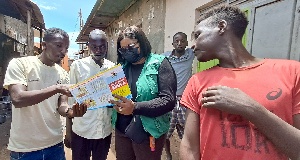Africa News of Monday, 19 May 2025
Source: www.ghanawebbers.com
Uganda: In Uganda, Ebola Comes to an End, but Vigilance Continues
On April 26, 2025, Uganda's Minister of Health, Dr. Jane Ruth Aceng Ocero, announced the end of the eighth Ebola outbreak. This declaration came 42 days after the last case was discharged. No new Ebola cases had been reported during this time.
However, there is still much work to be done. The Africa Centres for Disease Control and Prevention (Africa CDC), WHO, UNICEF, and other partners are focused on preventing a resurgence of the disease. If Ebola does return, they aim to make it less deadly.
Uganda has been a leader in responding to Ebola since its first major crisis in 2000. That outbreak resulted in over 200 deaths. The latest outbreak involved the Sudan strain and was declared on January 30, 2025, following the death of a nurse who showed symptoms at multiple health facilities.
The outbreak spread across seven districts and three cities: Kampala, Mbale (District and City), Wakiso, Jinja (District and City), Ntoroko, Fort Portal, and Kyegegwa. Uganda quickly responded with various interventions such as active surveillance and public awareness campaigns. These efforts helped contain the outbreak despite no approved vaccines or treatments for this strain.
In total, fourteen people were infected; four died while ten recovered. The survivors are receiving support like counseling and health check-ups. More than 530 contacts were identified and monitored during this period.
Africa CDC played a crucial role in Uganda's response to Ebola. They deployed a multidisciplinary team soon after the outbreak began. This team worked with Uganda’s Ministry of Health to improve coordination and community engagement.
Nearly 900 community health workers received training along with 80 surveillance officers. Additionally, 40 infection prevention mentors were sent to high-risk areas for support. Laboratory capacity was enhanced with diagnostic kits to speed up case confirmation.
Declaring a country "Ebola-free" is just one milestone; sustaining preparedness is essential. Africa CDC is collaborating with Ugandan scientists on a national sero-survey to assess exposure levels among people without symptoms.
They also plan a Knowledge, Attitudes, and Practices (KAP) study among contacts of SVD cases to improve future responses. Africa CDC is providing $4.3 million in emergency supplies and technical assistance during the recovery phase.
Dr. Jean Kaseya from Africa CDC emphasized their commitment to building resilience across Africa for health emergencies. Uganda aims to turn recent progress into lasting change through strong post-outbreak management strategies.
Isolation centers used during the response will be repurposed as training hubs for emergency readiness. Health authorities continue strong surveillance due to Uganda's unique ecological setting where humans interact closely with animals.
"This outbreak highlights why a One Health approach is vital," said Molla from Africa CDC. Future spillover events are likely; thus strengthening early warning systems is critical.
In Mubende, Gulu, Wakiso, and Mbale, ongoing care programs provide medical treatment and psychosocial support for survivors' reintegration into communities. Uganda is also advancing trials for an Ebola vaccine as part of prevention efforts.
"Ending an outbreak isn't the end," said Dr Ocero; it's about building stronger systems for future public health emergencies.











